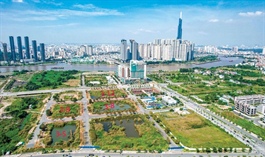Auction shock could bring breakthrough for investors
Auction shock could bring breakthrough for investors
The recent auction of four golden land sites in Thu Thiem New Urban Area has increased attention to the country’s land auction process and the issues that financiers may face.
Our research shows that the growth rate of new supply in Vietnam’s residential market, especially in Ho Chi Minh City, has continuously decreased by an average of 22 per cent per annum over the last four years. Limited land banks, licensing issues, and the pandemic have all contributed to this situation.
With the increasing demand from the population for places to live and attain land increasingly scarce, the land auction has been considered as an effective solution within the industry to promote development whilst providing a level playing field for entering the market and accessing land sites.
Auctions provide opportunities for investors to acquire these ‘golden’ land sites within the city, but there remain many difficulties for investors in preparation for successful land acquisition.
The first challenge is access to information. Foreign investors struggle to learn of the bidding, and local investors often have been aware for a long time before them. Even when the bidding is announced publicly, the announcement is usually just a printed display within the Ho Chi Minh City Property Auction Service Centre and sent to relevant parties rather than being made public through the media and other digital channels.
Another hurdle faced by foreign investors is that the 10-page-plus bidding notice is only available in Vietnamese with no corresponding notice in English, further limiting the opportunity for participation.
Vietnam’s real estate market in recent years has recorded active participation from investors from Japan, South Korea, and China, countries which often do not use English as a primary language. Notices in these languages would be warmly welcomed.
The second challenge is the time to prepare all the required documents for the auction. Normally, investors will have 2-3 weeks to prepare for the auction from the date of the official announcement. The auction of the four land plots in Thu Thiem, for example, allowed only three weeks to prepare the relevant documents. Within the industry, three weeks is not considered sufficient time to prepare for an auction, particularly for foreign investors.
Under the Law on Bidding in Vietnam, only companies with an enterprise registration certificate (ERC) in real estate business are eligible to participate in an auction. Unless these investors already have an available legal entity in Vietnam to support the auction, the establishment of this new legal entity with a valid ERC might easily take more than three weeks.
Also under the law, investors need to deposit 20 per cent of the starting price and this amount needs to be documented in writing without a bank guarantee. Most foreign investors in Vietnam will need time and approval from a parent company to do this, which adds even more to the preparation time.
Last but not least is the availability of data to support investor decisions in proposing a competitive bidding price. The property information provided by the Auction Center is usually just limited to very basic info such as land location, land size, and legal status, while investors will require much more to run a feasibility study for the auctioned land to make sure they can make a decent profit with the bidding price.
There is also no single contact point for investors to reach out to when they have questions about land details – they have to contact various related government departments, which is time-consuming.
To create a level playing field for both foreign and local investors in the bidding process, it is strongly suggested that auction information be provided in formats that allow all investors equal access.
Ideally, this information should be published in both Vietnamese and English. For key land plots like Thu Thiem, there should be a single contact point that is responsible for the entire pre- and post-auction process, guiding a detailed process and providing approved information to foreign investors.
At the same time, a timeline for the auction process should also be considered so that overseas investors have enough time to prepare all relevant documents and investment capital for the acquisition of the auctioned land.
Given the desire to attract more investment in Vietnam, it is hoped that the land auction process will be managed and organised in a better fashion by the government and related authorities, in order to strengthen the trust of non-Vietnamese investors when taking part.























